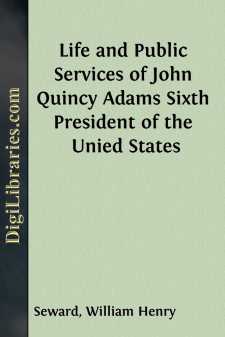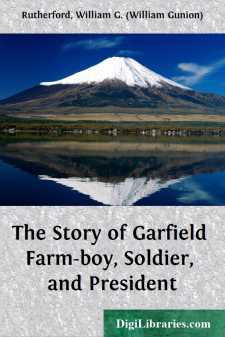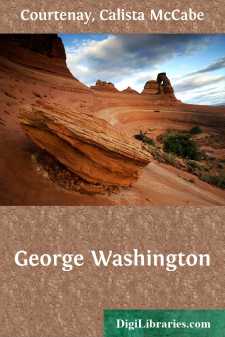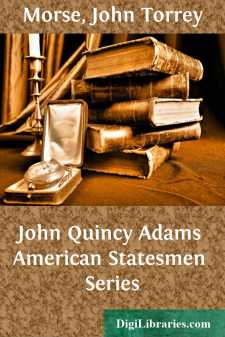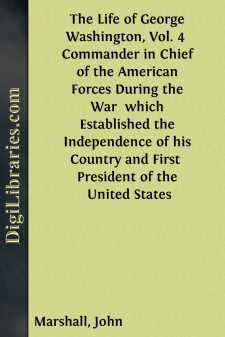Biography & Autobiography
- Adventurers & Explorers 15
- Artists, Architects, Photographers 16
- Business 2
- Composers & Musicians 14
- Criminals & Outlaws 5
- Editors, Journalists, Publishers 6
- Educators 1
- Entertainment & Performing Arts 3
- General 74
- Health, Exercise & Fitness 1
- Historians 3
- Historical 83
- Law Enforcement 1
- Lawyers & Judges 3
- Literary 147
- Medical 7
- Military 48
- Naturalists, Gardeners, Environmentalists 8
- Personal Memoirs & Diaries 227
- Philosophers 3
- Political 9
- Presidents & Heads of State
- Religious 38
- Rich & Famous 27
- Scientists 13
- Women 31
Presidents & Heads of State Books
Sort by:
CHAPTER I. THE ANCESTRY, BIRTH, AND CHILDHOOD, OF JOHN QUINCY ADAMS. The Puritan Pilgrims of the May-Flower landed on Plymouth Rock, and founded the Colony of Massachusetts, on the 21st day of December, 1620. HENRY ADAMS, the founder of the Adams family in America, fled from ecclesiastical oppression in England, and joined the Colony at a very early period, but at what precise time is not recorded. He...
more...
CHAPTER I. The United States Sixty Years ago—The "Queen City" of the West—The Rush for New Lands—Marvellous Growth of American Cities. Go to Liverpool or Glasgow, and embark on one of the great ocean steamers, which are constantly crossing the Atlantic. Sail westwards for about a week, and you will reach the eastern shores of the New World. If you land at New York, you will find yourself...
more...
by:
Arthur Galton
INTRODUCTION "I am going to offer to the publick the Translation of a work, which, for wisdom and force, is in higher fame and consideration, than almost any other that has yet appeared amongst men:" it is in this way, that Thomas Gordon begins The Discourses, which he has inserted into his rendering of Tacitus; and I can find none better to introduce this volume, which my readers owe to...
more...
CHAPTER I WASHINGTON'S EARLY LIFE—APPOINTED AS SURVEYOR—FIRST TRIP INTO THE WILDERNESS—ENTRUSTED WITH MESSAGE TO THE FRENCH—1732-1754 The twenty-second day of February is a national holiday in America because, as everybody knows, it is the anniversary of George Washington's birthday. All loyal Americans love and honor him, the greatest man in the history of the Republic. He was born...
more...
INTRODUCTION. Very little is known concerning the life of Tacitus, the historian, except that which he tells us in his own writings and those incidents which are related of him by his contemporary, Pliny. His full name was Caius Cornelius Tacitus. The date of his birth can only be arrived at by conjecture, and then only approximately. The younger Pliny speaks of him as prope modum aequales, about the...
more...
ANCESTRY. Line of Descent—Family Tradition—Indian Fighters—Grandfather Rutherford—Chloe Smith Hayes—Father and Mother—Characteristics—Tributes to a Sister—General Character of Ancestors. George Hayes, of Scotland, came to America by the way of England, and settled at Windsor, in the Colony of Connecticut, in 1682. He married, in 1683, Abigail Dibble, who was born on Long Island in 1666....
more...
by:
John Hay
CHAPTER I JEFFERSON DAVIS ON REBELLION Sumner to Howard, May 16, 1856. Ibid., p. 37. Shannon to Sumner, May 21, 1856. Senate Ex. Doc., 3d Sess. 34th Cong. Vol. III., p. 38. 1856. Shannon to Sumner, June 4, 1856. Senate Ex. Doc., 3d Sess. 34th Cong. Vol. III., p. 45. While the town of Lawrence was undergoing burning and pillage, Governor Shannon wrote to Colonel Sumner to say that as the marshal and...
more...
WARREN GAMALIEL HARDING Every time we elect a new President we learn what a various creature is the Typical American. When Mr. Roosevelt was in the White House the Typical American was gay, robustious, full of the joy of living, an expansive spirit from the frontier, a picaresque twentieth century middle class Cavalier. He hit the line hard and did not flinch. And his laugh shook the skies. Came...
more...
PREFACE Nearly sixteen years have elapsed since this book was written. In that time sundry inaccuracies have been called to my attention, and have been corrected, and it may be fairly hoped that after the lapse of so long a period all errors in matters of fact have been eliminated. I am not aware that any fresh material has been made public, or that any new views have been presented which would...
more...
by:
John Marshall
CHAPTER I. Greene invests Camden.... Battle of Hobkirk's Hill.... Progress of Marion and Lee.... Lord Rawdon retires into the lower country.... Greene invests Ninety Six.... Is repulsed.... Retires from that place.... Active movements of the two armies.... After a short repose they resume active operations.... Battle of Eutaw.... The British army retires towards Charleston. 1781In South Carolina...
more...


